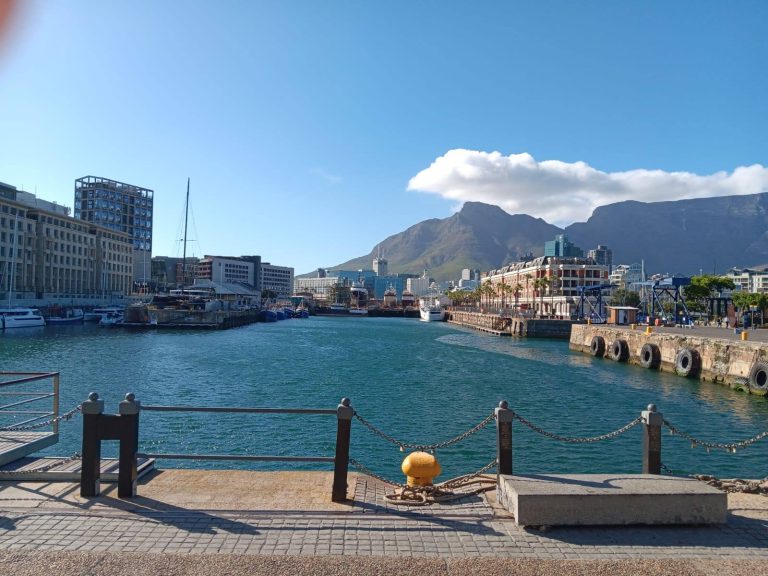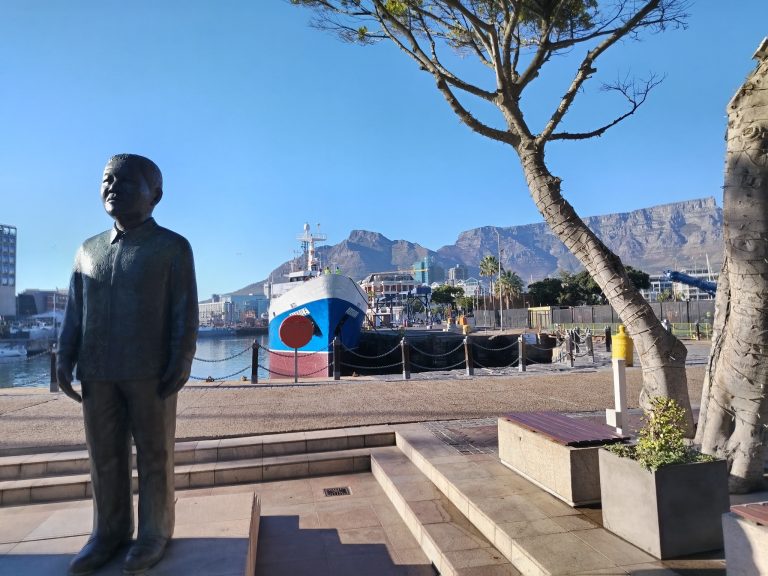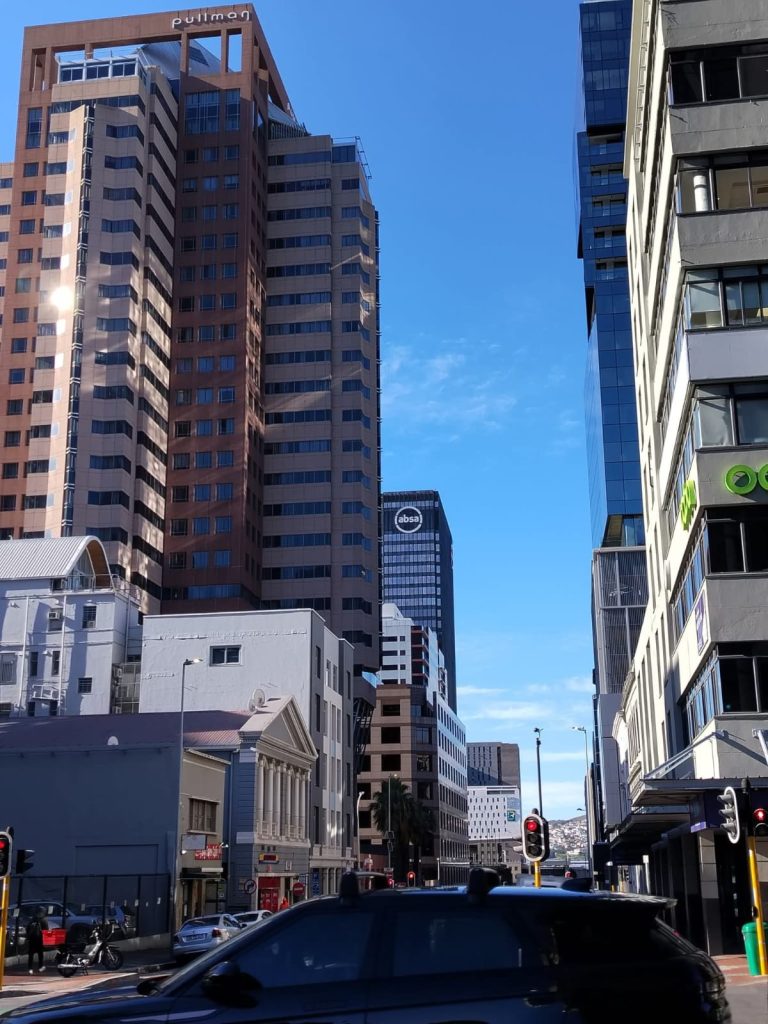Scrap Black Economic Empowerment (BEE). Instead focus on employment equity and a State Bank to finance small business. Remove all red tape for small businesses and change the way our cities are planned and managed. Now that would result in real black economic empowerment and a thriving non-racial society for all.
By Gerald Garner
[ABOUT THE AUTHOR]
Gerald Garner is a renowned storyteller and tour guide, based in Cape Town. Founder of LocalPlaces he is a passionate historian and an enthusiastic commentator on contemporary politics. With a background in landscape architecture and urban design, as well as journalism, he closely follows the history and development of cities, and of society at large. His unique insight into history, always viewed within the context of international relations, gives him a unique vantage point from which to analyze contemporary issues in South Africa.
The entire world seems to be going insane around us. From the USA’s trade wars to Afriforum’s opportunistic attempt to drag South Africa into the equation, it is easy to become despondent. Truth is South Africa has been struggling, ever since the World Financial Crisis of 2007/8, to get back onto a growth path. Development has been slow and economic growth stagnant. The dream of a better society, which seemed attainable in the first 15 years of democracy, has become illusive in the latter 15 years.
State capture, wide-scale corruption in both the private and public sector, and an inefficient government at national, provincial and local levels, have left millions in poverty, frustrating most South Africans. This has created precisely the gap which extremists such as Afrikaner Nationalists and black militant-inspired political parties exploit today. Hence it is so easy to feel only doom and gloom.
But it does not have to be like this. What leaves me flabbergasted is how this situation has been created by both the ANC and the DA. These parties have been governing in various provinces and towns/cities for decades already. They have also been the main players in the Government of National Unity for the past year. Yet they are unable to present a better vision for South Africa.
Nowadays few people would deny that Cape Town and the Western Cape are more effectively governed than the rest of the country – with infrastructure development, maintenance and job creation certainly out pacing the rest of the country. But even so, Cape Town continues to face mass poverty – clear as daylight when flying into the airport amidst the Cape Flats townships. Thirty years into democracy these townships still lack sufficient infrastructure and housing. They still look much poorer than the townships of Johannesburg.
For me it all comes back to the 1994 political compromise in which the ANC and opposition parties agreed that it was most important to protect the status quo in terms of the economy that existed then, and to grow the economy slowly, in the process expanding access to the economy for people who were excluded during the Apartheid era.
The fact is that this expansion has been way too slow to bring everyone who were excluded or discriminated against during Apartheid, into the economy. In recent times, it has been so slow that even those who flourished previously are now beginning to stagnate. Add to that population growth and migration, and the South Africa of today is completely failing to create a better life for its people. And it will continue to be the case for as long as our government and the main political parties that participate in this government fail to create a strong vision for the future of our country.
How could South African possibly grow by protecting the traditional white economy and expanding it slowly through a process of BEE? South Africa cannot grow by dishing out grants to all and sundry who are not absorbed into the active economy. And South Africa cannot grow by cross subsidizing the poor (as is the case in municipalities), while at the same time keeping them locked into poverty by keeping them far away from economic opportunities.
Here are six things that South Africa needs to do urgently, if it wants to move onto a new path towards prosperity:
Scrap BEE
Black Economic Empowerment in its current form is the most ineffective concept that protects white business and gives only a small black elite a share in that economy. One can argue that Afrikaner Empowerment from the 1920s and up to the 1990s was most successful, lifting the so called ‘poor whites’ (poor Afrikaners) out of poverty. But it is essential to understand that this was done on the premises of the Afrikaners as the poor MINORITY within the white economy that was English dominated then. Economic Empowerment can always succeed as a policy where a minority is to be uplifted. But never where it is the majority at stake (as the sheer number of people cannot be slowly absorbed into the economy).
It is also crucial to understand that Afrikaner Empowerment relied mostly on employment equity rather than promoting Afrikaans business ownership. It was through jobs in state owned enterprises and in government itself that Afrikaners were lifted out of poverty. Also by ensuring they were employed in sufficient numbers within corporate business. Over time, Afrikaners also became entrepreneurs, running their own businesses but to be honest, a lot of this was only achieved in the 1990s by which time Afrikaners had already benefited from a generation or two of consistent employment.
Mining companies, engineering companies and construction companies that relied on state tenders were in essence majority English in origin, but by the 1980s often dominated by Afrikaner employees and management. Yes, significant Afrikaner companies like Gencor were created but they were still in the minority by 1990.
Considering the demographics of today, BEE could never have the desired outcome in South Africa. Considering that 7.5% of the population can be classified as ‘white’ today. This equates to 4,5-million people. Assuming that less than half this number are economically active (removing those past retirement and those too young to work), then only two million of those people are economically active. And two thirds probably work within corporate business or within government, especially in education. That leaves at most 750 000 white people that possibly work within small business in South Africa. My assumption is that at most half of them would own small businesses or be self-employed, with the rest working for such businesses. This, at most, leaves 375 000 small white-owned businesses. Now if all these businesses managed over time to implement BEE and become 50% black owned, it would created co-ownership jobs for only 375 000 black people. (out of 48-million black people in the country). This shows that forcing black equity/ownership will never solve South Africa’s problems.
As for corporate business, these can only be a few thousand in total across South Africa. Even forcing them all to be 50% or more black-owned, it would only create only a small elite of black shareholders.
Expecting government tenders that are awarded to majority black-owned business to create enough work for 48-million black South Africans is also unrealistic. The fact is such businesses are often not established on a skills basis or service offering but in reaction to a tender that is available. This is no way to grow a business that can be sustainably successful. As soon as the tender is complete or the work left incomplete, the business may seize to operate. Creating ZERO sustainable jobs and maybe leaving a couple of shareholders a bit wealthier, albeit temporarily.
The majority of people who were discriminated against during apartheid, cannot be economically empowered by thinking that they can be slowly absorbed into the minority of white business. Instead, they need to be independently empowered to start their own successful businesses over time, but with understanding that in any society only a minority of people would have the appetite for running businesses and the majority would choose employment instead.
Focus on Employment Equity instead within government and within corporate business.
What is most crucial is to ensure employment equity is strongly enforced to create a diverse society across all income groups and skills sets. This is really a straightforward process. Ensure that all government departments and entities, and all corporate business above a certain size stick to equity laws in line with population demographics: 80% of jobs for Black Africans, 9% for Coloureds, 7,5% for Whites, 3% for Indian etc (obviously these percentages must be vetted to reflect the actual reality and may have to be applied in relation to regional/provincial realities).
Remove all red tape and bureaucracy from small business
Let small businesses flourish by removing all unnecessary red tape/compliance. From BEE to complicated tax arrangements for employing people. Also allow a much higher VAT threshold, and a much more lenient dispensation for turnover tax instead.
For example, how can it be effective to force every small business to go to a police station every three months to get an affidavit signed as to its black ownership credentials or that it is too small to have to comply with black ownership. And then to have to submit it to every corporate or government client it has, to get business? No, we need to free small businesses to grow and to create jobs!
Instead of focusing on ownership, focus on employment equity here too. As soon as a business has more than 10 staff members, it must start implementing employment equity.
Create a state bank or finance organization
Something like the Land Bank or Nasfas but that finances small business with less red tape and easier accessible loans. Use this to especially boost BLACK business and grow the economy. Simply award loans in proportion to the country’s demographics: 80% to black owned business, 9% to coloured, 7,5% to white etc. While this may sound like discrimination it is not. The fact is white business has easiest access to finance anyway. To grow the economy, we must increase the number of successful businesses and ensure that black business has access to finance and can grow sustainably (and not based on dependency of government tenders).
Note that these ‘racial’ criteria should only apply to finance from this state institution. It should not apply to finance from the private sector. It also should have nothing to do with the awarding of tenders.
Remove ALL racial criteria to do with business ownership in how government awards tenders
By fixing employment equity and finance for black business, the government would no longer have to spend half its administrative effort on managing the BEE process for tenders. Government should award all tenders based on the combination of best price and best skills/product offering. No racial quotas should apply here at all, other than companies being compliant in terms of tax and employment equity.
Change the way city councils manage and plan their cities
Here I refer to a recent remark by Geordin Hill-Lewis (mayor of Cape Town) that the city needs high-in-demand areas such as Fresnay and Clifton to attract property investment as this generates significant rates and taxes. Which is then used to cross-subsidize infrastructure development and services in poorer townships. While this may sound positive and sustainable, it would never lift people trapped in poor areas out of poverty and would forever make them dependent on the ‘charity’ of rich areas.
The major cause of poverty here is apartheid spatial planning. We cannot expect the poor to live far away in townships from where they must spend half their income (and time!) to travel to low-income jobs elsewhere. We can only create a better society and economy by MOVING them closer to economic opportunities. The subsidized taxes are being spent in the WRONG places. What is crucial is to develop public land within proximity to economic opportunities. We need decent publicly developed and managed social housing in the right places – on all land that lies idle and owned by local, provincial, national government and government agencies or State Owned Entreprises. Yes, there needs to be affordable housing near Clifton and Fresnaye and throughout the City Bowl.
And no one in South Africa should expect to live in any area or neigbourbood, or work anywhere that is majority white, coloured, Indian or whatever. We need to understand that 80% of our population is black African. And if you do not want to accept this reality, then why live in Africa? South Africa can only succeed if it empowers all its people. And BEE would never do that. All it has done is to keep a minority in economic power. During Apartheid that minority was exclusively white. Today it is more than half black. But even if it was 100% black it would still remain a minority, at most 10% of the population – perhaps 6-million people. Leaving 44-million people out of the equation.
Vuka Mzansi! Wake up South Arica! Create a new vision, fix your failed policies and move onto a new trajectory of growth!




